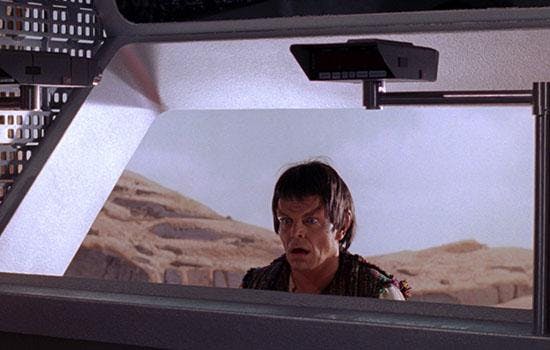Published Aug 27, 2014
The Study of Humanity: Trek Edition - A Closer Look
The Study of Humanity: Trek Edition - A Closer Look

In this series, we examine representations of anthropology in the Star Trek TV series. You can read part one HERE to learn more about anthropology. In this second installment of the series, we examine the Star Trek: The Next Generation episode “Who Watches the Watchers” (S3E4), and compare the representation it gives of anthropology and anthropologists with the current state of our discipline.
Plot
A team of three anthropologists awaits the assistance of the Enterprise on Mintaka 3. As Deanna Troi states: “According to Dr. Barron’s preliminary reports, the Mintakans are proto-Vulcan humanoids of a Bronze Age level.” In order to study the inhabitants of the planet, the anthropologists are using a holographic generator which conceals their presence, and they are having problems with this technology. Before the Enterprise can reach the team, an explosion injures them and renders the holographic generator useless.
An away team eventually reaches them, but before they can repair the damages and hide the outpost from the inhabitants, a Mintakan, Liko, glances into the outpost. Afraid, he falls off a cliff and is knocked unconscious. His daughter Oji hides as Doctor Crusher beams her father to sickbay. While on the Enterprise, Liko awakes and catches a glimpse of Captain Picard. When he is beamed back to Mintaka 3, he believes Picard brought him back to life: according to ancient Mintakan myths, he thinks Picard is the Overseer.

Upon realizing that the Mintakans’ beliefs have been altered by contact with the crew of the Enterprise, which breaches the Prime Directive, Picard is faced with a troubling situation. The lead anthropologist for the mission, Doctor Barron, suggests Picard should go down to the planet, masquerading as the Overseer to give the people guidelines dictating what he expects of them. He claims that the Mintakans will inevitably develop a religion around the Overseer, and that without guidelines the religion could degenerate into “chaos.”
Picard rejects the idea and decides to bring the Mintakan leader, a woman named Nuria, aboard the Enterprise to convince her to dispel the "magical" beliefs her people are regressing to. In the end, Picard and Nuria convince the Mintakan people that he is not the Overseer.
When the Mintakans ask Picard why his people wanted to study them, he replies: ?We were once as you are now. To study you is to understand ourselves.”
Anthropological research or duck hunting?
Does this episode provide an accurate portrayal of anthropologists and anthropology? The answer is not as simple as yes or no.
Troi’s statement about the Mintakan people being at a “Bronze Age level” is problematic. Although anthropologists, and other scientists and philosophers, used to believe it possible to classify societies in categories according to what was considered as their level of technological advancement, such notions no longer hold scientific credibility. Instead, a majority of anthropologists now consider such classifications to be biased by Western ideas of what advancement can be measured by, technological prowess, for instance, and of how important such advancement is. Classifying societies along a continuum which spans from Bronze Age to pre-industrial to modern is based on the arrogant and colonial idea that all societies must eventually progress as Western civilization has.
Similarly, Picard’s statement about the relevance of studying other cultures to understand another’s past is unrealistic: comparative studies may still be relevant and useful in anthropology, but it is no longer considered possible to know about the past state of a culture by studying the current state of another. Not all societies change and evolve by following the same path the West has. And if it doesn’t make sense to use the history of Western civilization as a template to study other cultures, why would it make sense to use it to study alien races?
The way the anthropological study is described in this episode also deserves attention : it reminds us more of a hunting expedition that of ethnographic research.
Geordi: Oh a duckblind! Right they’re anthropologists.
Picard: Who are studying an extended family of Mintakans at close range from a camouflaged observation post.

Nowadays, no respectable anthropologist would conduct research ?from a camouflaged observation post” without engaging in dialogue with the community he or she wishes to learn more about. The idea that anthropologists take a distanced, hands-off approach to studying other cultures is an old cliché. The basis of anthropological research is ethnography, involvement (participant observation) in the community the anthropologist is investigating.
Contemporary anthropologists follow rigorous ethical standards and procedures before engaging with the people they hope to learn more about. Research is now done with participants’ consent, and anthropologists are careful to explicitly disclose why they are researching and what they hope to achieve.
Lastly, we find it important to mention that anthropologists don’t necessarily study people who are different from themselves. The portrayal of an anthropologist in some remote location with a so-called ‘’exotic’’ tribe is not an entirely accurate reflection of contemporary anthropological research. For example, we have conducted research on the fake geek girl debate and female participating in geek culture (Renaud 2014) and star parties and amateur astronomers (Slobodian 2014). Other anthropologists may study gaming habits of World of Warcraft players (Nardi 2010) or Star Trek fan clubs: Professor Daryl G. Frazetti has written about such research right HERE on StarTrek.com (Frazetti 2011).
Therefore, the episode tends to perpetuate the idea that anthropologists study only the “exotic” or those who are vastly different from themselves.
So, did the writer of the episode get it completely wrong?
You may have noticed that we have been talking about contemporary anthropology, using words such as "nowadays," "current" or "no longer." This is because anthropology has changed drastically in recent decades with post-modernism and post-colonialism. But while the writer may not give an accurate representation of contemporary anthropology, which is why we find so many faults with the episode, the representations he provides are not entirely erroneous in light of the past of our discipline. It may be that he relied on everlasting clichés about anthropology.
This is makes the episode appear unrealistic in light of the contemporary ethical, theoretical and methodological norms in anthropology, considering that the story is set in the future. Unless the discipline reverted to its past standards, the anthropologists in the episode would not act the way they do.
More could be said about the episode, post-modernism, race, the Prime Directive or about the very notion of “exotic.” But in the interest of keeping this discussion short and sweet, let us address some of these topics tomorrow in the thrid and final part of this series.

Do you know of other examples of representations of anthropologists in the Star Trek universe? Feel free to discuss them here!
References
Frazetti, D. G. 2011, April 26. “Star Trek and the Culture of Fandom”. Star Trek, accessed online on June 20th, 2014 at http://www.startrek.com/article/star-trek-and-the-culture-of-fandom.
Nardi, B. 2010. My Life as a Night Elf Priest: An Anthropological Account of World of Warcraft. Ann Arbor: University of Michigan Press.
Renaud, M-P. 2014, March 21. “The Fake Geek Girl Project / 1”. The Geek Anthropologist, accessed online on June 20th, 2014 at http://thegeekanthropologist.com/2014/03/21/thfakegeekgirlproject-1/.
Slobodian, R. 2014. “Star Parties: An Ethnographic Exploration of Amateur and Professional Astronomers”. Contingent Horizons, 1(1): 63-81, accessed online on June 20th, 2014 at http://contingenthorizons.files.wordpress.com/2014/04/ch11-63-81-slobodian.pdf
_______________
Marie-Pierre Renaud is graduate student of sociocultural anthropology in Laval University, Quebec, Canada. She specializes in native studies and her work focuses on healing and reconciliation processes. As the founder and a co-editor of The Geek Anthropologist blog, which is dedicated to the anthropological study of geek culture and all things geek, she writes about women in geek culture, the representations of indigenous peoples in science-fiction, and the changing definitions of geekiness. She can be reached at thegeekanthropologist[at]gmail.com. And check out her previous StarTrek.com guest blogs, A Study on Geek Girls, HERE and HERE.
Rayna Slobodian is currently an Undergraduate student in anthropology at York University in Toronto, Canada. Her love for Star Trek is genetic, as she was named after the android from the TOS episode, “Requiem for Methuselah.” The human story has always fascinated her, especially when it comes to exploring life through imagination. Her anthropological interests include death studies, human factors in space, classism, ethics, and science and technology studies. Feel free to reach her at rayna.ca[at]gmail.com.

